Many dental practices have a drawing or monthly prize that your child can be entered into if they have no cavities at their 6 month check-up examination, often known as a “No Cavity Club”. When starting my practice, The Tooth Ferry Pediatric Dentistry, I very much wanted to reward kids for coming to their 6 month check-up visit, however, I did not want to penalize kids who have cavities diagnosed at that visit.
Why do children get cavities? Is it entirely a lack of brushing? Eating lots of candy? Our understanding of why tooth decay (cavities) form is so much more advanced than it was when I was a kid. When I was a child, I visited the dentist regularly and brushed my teeth every night and yet I was still told I had new cavities at (what felt like) every visit. I was always chastised that I needed to brush better and eat less candy. Yet, my house was the house with very few sweets and candy compared to my friends’ houses. When I would spend overnights at my friends’ houses, I was always amazed that my friends would stay up late eating nothing but junk-food and candy and fall asleep without brushing their teeth and most of them had never had a cavity. Meanwhile, I would stay up after everyone else had gone to sleep so I could make sure to both brush and floss my teeth before bed (I was terrified of getting another cavity!) What was going on here? Why was the distribution of decay among myself and my friends so disproportionate to the dietary and hygiene habits I was observing?
We now know that diet and hygiene habits play a part in the formation of tooth decay, but there are many other factors which cannot be altered that can drastically increase your risk of decay. Some of these factors are genetic (tooth mineralization, salivary components, salivary viscosity, food preferences, eating frequency preferences, etc…) and some have to do with the bacterial population that lives in your saliva. All babies are born with sterile mouths and saliva, but by the time the first tooth begins to appear in the mouth, the saliva is colonized by a unique bacterial population that can make a person more or less prone to developing cavities. Most babies acquire a similar bacterial population to their primary caregiver (so, if Mom or Dad has a lot of cavities, it is likely the child will too). For children who lack these underlying risk factors, frequent consumption of sugars and starches and infrequent brushing habits may not lead to cavities. BUT, for children with underlying risk factors, a normal level of oral hygiene and consumption of sugary/starchy foods will lead to many areas of decay.
Because so much of what causes tooth decay is not within our direct control, it seems unfair to penalize kids who come to the dentist and have cavities diagnosed. In many cases, the oral hygiene of kids with tooth decay is as good (or better!) as some kiddos who don’t have decay. For this reason, I decided to enter every child who comes in for a check-up into our drawing each month for a prize (a gift card to a local toy store) regardless of whether they have cavities or not. This way, kids are rewarded for keeping up with the very important self-care routine of visiting the dentist, regardless of whether they are highly susceptible to tooth decay or not. Instead of being called a No Cavity Club, I call it our Little Mariner of the Month club, and I hope it helps kids to feel more positively about visiting the dentist than I did as a child.
